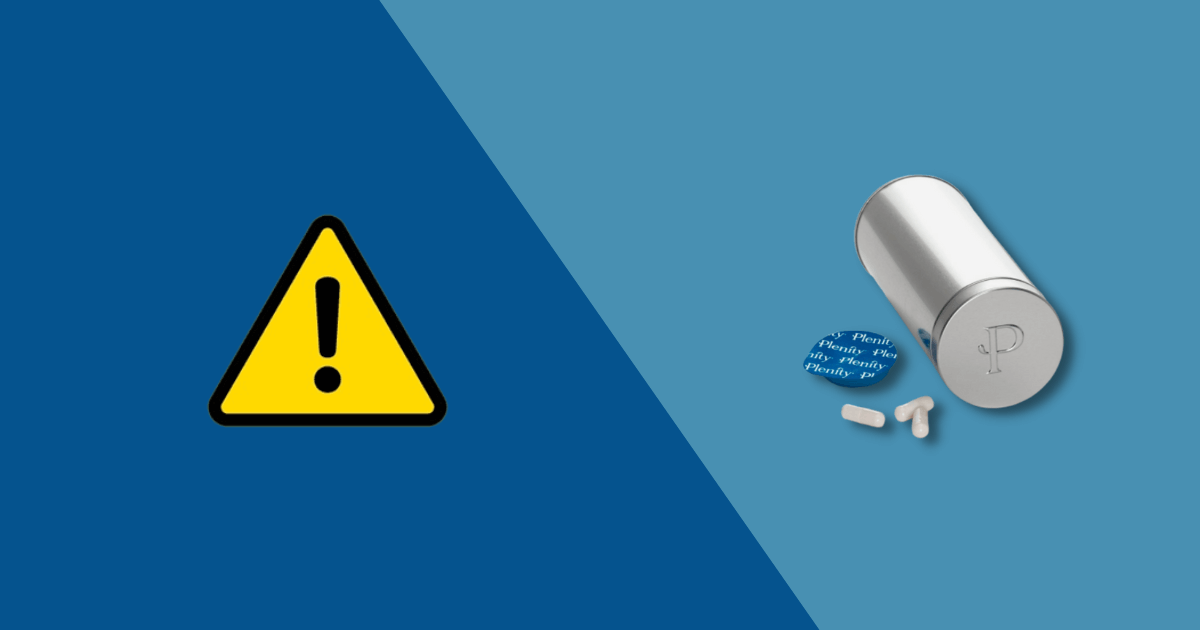Plenity side effects and how to avoid them
Table of contents
Plenity is an FDA-approved (U.S. Food and Drug Administration) medication manufactured by Gelesis. It is classified as a weight loss medication and is used to help with weight management in overweight adults. While Plenity is generally well tolerated, there are some potential side effects that people should be aware of. The most common side effects of Plenity include constipation and abdominal pain.
Learn more about the side effects of Plenity and what you can do to avoid them.
What is Plenity?
Plenity is a weight loss aid and weight management tool used with a healthy diet and exercise to treat obese adults with excess weight or obesity with a body mass index (BMI) of 25 to 40 kg/㎡.
Plenity weight loss pills contain superabsorbent hydrogel particles made of naturally derived building blocks, which absorb water once in the stomach. The gel particles mix with foods, creating a larger volume with higher elasticity and thickness in the stomach and small intestine, promoting satiety and fullness. The hydrogel is partially broken down by enzymes in the large intestine, losing most of its absorption ability. The released water is reabsorbed, with the cellulosic material excreted in the feces.
In clinical studies, 59% of Plenity responders had an average weight loss of 10% of their body weight in six months. Plenity is safe for people with or without other conditions such as hypertension, type 2 diabetes, or dyslipidemia.
Plenity dosage
Plenity is a prescription-only capsule available in the following doses: 0.75 grams.
You are advised to read the medication guide provided with this medicine for the drug information and patient information, and always speak with your healthcare provider for medical advice about any changes to your dose so they can monitor and evaluate your condition.
Plenity side effects
In clinical trials (Gelesis Loss of Weight), there was no overall difference in side effects between the treatment and placebo groups. The most common gastrointestinal side effects were:
- Diarrhea
- Bloating
- Nausea
- Infrequent bowel movements
- Constipation
- Abdominal pain
- Flatulence
Your doctor will assess the benefits of using Plenity against your risk of adverse events Patients are encouraged to report negative side effects or adverse reactions of Plenity to the FDA. Visit www.fda.gov/medwatch, or call 1-800-FDA-1088.
If you experience any of these side effects, seek medical attention immediately. You are encouraged to report the negative side effects of prescription drugs to the FDA. Visit www.fda.gov/medwatch, or call 1-800-FDA-1088.
Does Plenity cause headaches?
Headaches are not a side effect reported when using Plenity. Speak to your doctor for medical advice if you experience this side effect.
Plenity drug interactions
Other drugs may interact with Plenity, including prescription drugs and over-the-counter medicines, vitamins, and herbal products. Tell your healthcare provider about your medications, including any supplements you are taking. Before taking Plenity, be sure to tell your doctor about all of the medications you are taking to ensure they are safe to take at the same time.
Plenity warnings & precautions
You should not use Plenity if you:
- Are allergic to the active ingredients carboxymethyl cellulose and citric acid
- Have had an allergic reaction to gelatin, titanium dioxide, or any of the other ingredients in Plenity
- Are pregnant or are planning to become pregnant
Talk to your doctor before using Plenity if you:
- Are taking any of the medications that could interact with Plenity
- Have active gastroesophageal reflux, peptic ulcer, or heartburn
- Are breastfeeding or are planning to breastfeed
You should always check with your doctor or pharmacist before taking any medication, including Plenity, to make sure it is safe for you.
How to avoid Plenity side effects
The best way to avoid side effects is to take Plenity as directed by your doctor. Follow your doctor’s instructions carefully, and do not take more or less than prescribed.
If you experience any side effects, talk to your doctor or pharmacist. They may be able to recommend ways to help reduce or prevent some of the side effects.
1. Stick to the recommended dosage
Take your prescribed dose of Plenity recommended by your healthcare professional. Do not take more or less than prescribed.
2. Monitor your blood sugar levels
If you have diabetes, it is important to monitor your blood sugar levels closely while taking Plenity. Check your blood sugar levels as directed by your doctor and report any changes to your doctor immediately.
3. Drink plenty of fluids
Drink eight to 10 glasses of water or fluids every day to help prevent dehydration, which can make side effects worse.
4. Avoid alcohol
Avoid drinking alcohol while taking Plenity, as it can increase your risk of dizziness, depression, and impaired judgment.
5. Don’t skip meals
Eating regular meals and snacks will help to prevent low blood sugar levels (hypoglycemia).
6. Check your feet
If you have diabetes, check your feet for any cuts, sores, or redness regularly. Tell your doctor if you experience problems with your feet while taking Plenity.
7. Know the signs and symptoms of Plenity side effects
Signs and symptoms of side effects include constipation, bloating, and abdominal pain. If you experience any of these symptoms, speak to your doctor for medical advice.
8. Tell your doctor about all medications you’re taking
Be sure to tell your doctor about all other medications you’re taking, including over-the-counter drugs, vitamins, and herbal supplements, as they can interact with Plenity.
9. Get regular medical checkups
It is important to get regular medical checkups and monitor your medical conditions. Your doctor will monitor your side effects and may adjust your dose of Plenity as needed.
Medically reviewed
A medical professional has reviewed this article.


Jamie Winn, PharmD
Jamie Winn, PharmD
Dr. Jamie Winn received his Doctor of Pharmacy in 2002 from the University of South Carolina College of Pharmacy, Columbia, SC. Jamie is a medical reviewer for NiceRx.

